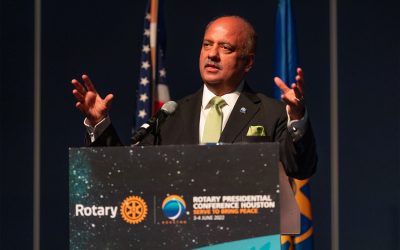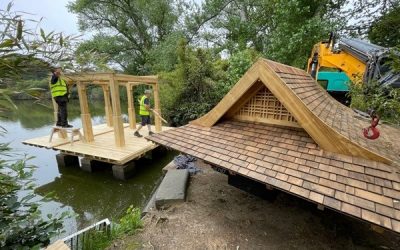The city of Coventry is preparing to host the second of Rotary’s Presidential Peace Building Conferences in February.
The conference, one of six being staged across the world, is the brainchild of Rotary International president Ian Riseley.
Other global conferences are taking place in Vancouver and Beirut in February, followed by Sydney, Chicago, and the Italian city of Taranto later this year. Each will focus on how peace relates to each of Rotary’s five areas of focus, as well as environmental sustainability.
The third leg of the tour on February 24th is at the Ricoh Arena in Coventry and has the theme: “Disease prevention and treatment, and peace”.
Ahead of the conference, the cricket-loving Australian spoke to Rotary magazine when he reflected on his challenges as RI president, Rotary’s place in the world and what is happening in Great Britain and Ireland.
On the Presidential Peacebuilding Conference:
“The world is relatively volatile and turbulent. I think Rotary is almost uniquely placed to make a difference in peace. We are just about everywhere in 200 countries and geographical regions.”
“Rotary is full of good people and we shouldn’t shy away from that; we are committed to peaceful relations, and I think Rotary can absolutely make a difference on peace which is why I have organised these conferences.”
“Peace is important and I believe Rotary can make a difference on peace.”
On the relevance of Rotary in 2018:
“We live in a different society than we did in 1905 when Rotary was founded, which is why we have to be receptive to change.”
“Charles Darwin on the origin of species talked about it not just being the strongest or the fastest or smartest who flourish, but it is those who are most adaptive to change, and I think he is exactly right. Rotary needs to make sure that we are receptive to change.”
“That is why, at the last council in April last year, it was so important for us. The council adopted so many changes to the way Rotary operates, by providing flexibility to the clubs and districts to operate more or less how they like. I think that is really important.”
“We need to appreciate the fact that it is not just gathering together as a group of all males as it was in Paul Harris’s time to have fellowship. Fellowship is a really important part of Rotary activity, but so is the service we provide around the world.”
“And so is the fact that women are an important part of our organisation. We need to be flexible, which is why we are involving younger people, and why it is important we allow Rotaractors to join Rotary clubs if they wish.”
On reducing the average age of Rotary membership:
“Your average age in the UK for a Rotary member is older than just about anywhere else.”
“I am delighted and very supportive of Rotary in Great Britain and Ireland President Denis Spiller’s approach to satellite clubs. I think that is the best way and I am using this initiative right around the world with what you can do.”
“If you look at the fact that if a club is comprised of mostly elderly people, sometimes it is going to be hard to attract people who are half their age. To start a new club you need 20 or 25 people, which can be difficult.”
“The advantage of a satellite club is that a lot of the administrative stuff is taken away by being part of an existing club. Hopefully, the satellite club will have a group of people who are younger than the membership of the main club, which will gradually grow and they can get absorbed into the other club over a period of time.”
“I think it is a master stroke by Denis and I am delighted to see there has been initial success.”
On tackling gender imbalance in Rotary:
“I am on record as saying that we need more women in our organisation. There is still a perception that because around 21% of our membership is female that we are a male-dominated organisation. We need to make sure the feminine perspective is received and understood.”
“Our society is comprised almost half men and women. Rotary is not. We have to adjust that and work to that at all levels of our organisation.”
On Rotary’s image:
“In Australia, there is this perception of Rotarians sizzling sausages outside a hardware store on a Sunday. We’ve got to be known for something more than that. That is the way you break the cycle.
“You can have younger people with younger, fresh ideas, who can be part of the organisation via a satellite club and they can develop their own ideas.”
“I like to think I understand people who are in the 30 to 40 year age group pretty well. In reality I don’t, because I am 70. They are a generation or a generation and a half younger than me.”
“So we need to have people who are of that vintage talking about and doing what they want to do.”
“The Board of Directors are going to get advice from a young Rotarians’ group – eight young Past District Governors, four women and four men, who have been asked to discuss a particular topic and one of them will come to the Board of Directors to present their perspective.”
“I don’t know what we will receive, frankly that is something which delights me. I don’t know whether they will say Rotary is a load of old rubbish – I don’t think they will because they are experienced – but what they will do is provide us with a fresh perspective.”
On E-Clubs:
“I absolutely love them. I started off being a bit ambivalent, but now I can see they fill a need for Rotarians who, for all sorts of reasons, can’t attend a regular meeting at a particular club, at a particular place.”
“One hundred and thirteen years ago, the local Rotary club in Chicago which Paul Harris and his colleagues founded was ideal for its time. When you talk about innovation and flexibility, E-Clubs are a very good example of how we have to adapt.”
“I have spoken to lots of E-Clubs, and I think they are a really important way of allowing people to stay active within Rotary. They are absolutely fabulous. I love them.”
On being Rotary President:
“I’d hate to count the air miles I have flown. But this is terrific fun.”
“Consciously, my wife Juliet and I have said we wanted to go to places where past presidents haven’t been. So that is why we went to Hungary and Serbia, Sardinia in Italy rather than going to Rome, so that we can meet people who would otherwise not see an RI President.”
“We have been to Panama, Honduras, and Antofagasta in northern Chile, which was fascinating. The last president to visit Antofagasta was Paul Harris in the 1930s. He also planted a tree, so that sort of thing really gives me a charge, it really does.”
“When you go to Brazil they are massively enthusiastic and do fabulous work, I love it. One of the delights about Rotary is that we are everywhere.”
“Everywhere we go, people do wonderful service and enjoy themselves at the same time. Enjoyment in Rotary is so critically important. Unless you are having fun, there is a limit to whether you will continue doing it or not.”
“Juliet and I are having fun, it is tiring and the romance of airports has long since evaporated, but I enjoy it very much.”
On his Rotary legacy:
“If, at the end of June 2018, the world knows more about Rotary than at the start of the year, then I will be content. Our public relations with the non-Rotarian world have been less than they should be for a long time.”
“We used to say Rotary doesn’t publicise its good works and we hide our light under a bushel. We would say: let our good deeds speak for themselves, blah, blah, blah. That is a load of nonsense.”
“Times have moved on from there. If we expect people to endorse what we do, to seek to join us and take part, then we need to make sure they know exactly what we do.”
“We are doing much better than we used to. We have to keep telling the world the very important part which Rotary has played in polio eradication when it takes place soon. This is a massive opportunity for us which we must not miss.”










